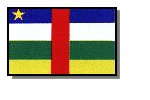

|



 Central African Republic
Central African Republic

|
Directory Information
|
The Central African Republic, a former territory of
French Equatorial Africa, is bounded by Chad on the
north, the Sudan on the east, Zaire and Congo on the
south, and Cameroon on the west. Population (1990
est.) 3,039,000; area 622,984 sq,km. The official
language is French. The national language is Sango.
History
The location of Ubailgi-Shari, the
earlier name of the Central African Republic, in the
heart of Africa was an obstacle for the first French
explorers. As a result, modern institutions were
established quite late in what had been an oral-tradition society. Libraries, archives, and documentation services are fairly recent in the Central African Republic.
The first libraries came into being with educational institutions at the beginning of the 20th century.
They were riot separate institutions, just collections of
books that supported the curriculum. Several decades
were to pass and independence achieved (1960) before
small libraries were set up in high schools and
professional schools.
Archives first appeared with the French colonists
who kept daily records and logs, sent reports to
France, and received directives back. Ubangi-Shari
was one of the countries of French Equatorial Africa
(FEA) that did not keep its historical archives. The
capital of FEA was Brazzaville, and the government's
records were held there. Before the countries achieved
independence, the archives were in large part transferred to Aix-en-Provence. The aim of the Central African Republic was the repatriation of those parts of the archives that concern the country.
The establishment of colonial institutions in the
French Overseas Territories was followed by various
local studies aimed at resource development. The
accumulation of such research led gradually to the
creation of documentation services, first in Brazzaville, then in Ubangi-Shari. The setting up of an
agricultural research center in Boukoko and of others
in the early 1940s marks the beginning of documentation services.
National Library
A decree of 1981 created a
National Library in the Central African Republic. The
government department in charge of culture took
steps to ensure that this institution would come into
being and a legal deposit law was adopted in 1986.
The National Archives, which reports to the office of the President of
the Republic, was created by law in 1969. Legislation
establishing an archives law in the Central African
Republic was signed in 1983.
A large draft conservation plan exists for historical archives still dispersed throughout the country, but
no real work had been started as of the early 1990s
because of a lack of funds. In the meantime, the
Director of the National Archives undertook a campaign of public talks, radio interviews, and other
public activities, in order to increase public awareness
of the problems of archives.
The most important private archives are those of
members of the clergy, former political figures, and
old business firms.
University Library
Since 1981 the University
Library, founded in 1970, at the same time as the
University of Bangui, has been in a building that
houses its science, literature, and law collections; the
medical school has its own library. There is seating
for only 100 (out of a student body of 2,000) in the
main building of the University Library.
Public Libraries
The public library system in
the country is run by the government's Culture
Department, assisted by the towns and cultural institutions such as the Protestant Youth Center and the
cultural centers of certain embassies in Bangui. An
objective of a new National Library is to play a major
role in the promotion of reading throughout the
country. In certain areas of Baiigui and in tire larger
towns outside of Bangui, youth centers offer art programs and set space aside for reading. There was,
in fact, no building housing a public library in the late
1980s. Users are for the most part elementary and
secondary school students.
Special Libraries
Special libraries are connected with international organizations whose
offices are in Bangui and with research institutes.
Among these are the libraries of the Organisation
Commune Africain e et Mauricienne (OCAM), the
Central African Customs and Economic Union
IUDEAC), and the Bureau interafricain des Sols et de
l'Economie Rurale.
The Profession
In 1990 the Central African
Republic had no library, archives, or documentation
school. Training in those fields was given by schools
elsewhere in Africa and in Europe, notably the
Universitv of Dakar (Senegal), the Ecole Nationale
Superieure de Bibliothe'caircs. the E'cole des Chartes,
and the Institut National des Techniques Documentaires in France and the E'cole des Sciences de
l'Information in Morocco. There was no librarians', archivists', or documentalists' association in the Central African Republic in the late 1980s.
Sources:



|